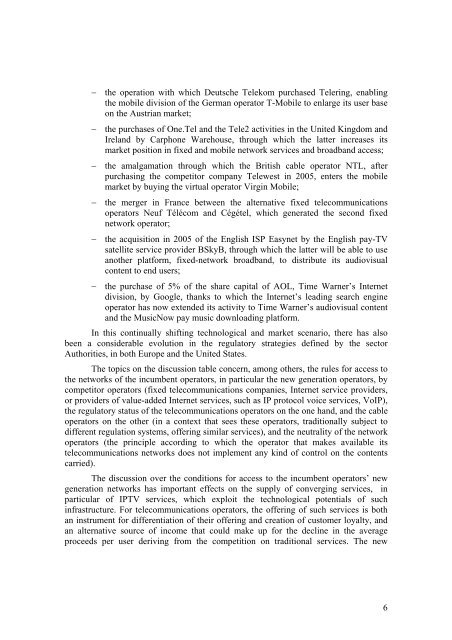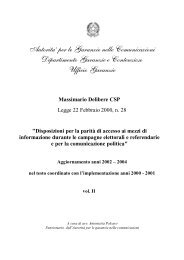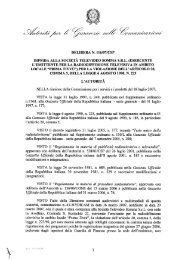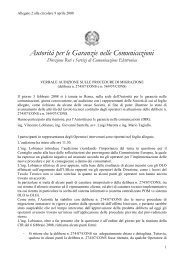Communications Regulatory Authority
Communications Regulatory Authority
Communications Regulatory Authority
Create successful ePaper yourself
Turn your PDF publications into a flip-book with our unique Google optimized e-Paper software.
− the operation with which Deutsche Telekom purchased Telering, enabling<br />
the mobile division of the German operator T-Mobile to enlarge its user base<br />
on the Austrian market;<br />
− the purchases of One.Tel and the Tele2 activities in the United Kingdom and<br />
Ireland by Carphone Warehouse, through which the latter increases its<br />
market position in fixed and mobile network services and broadband access;<br />
− the amalgamation through which the British cable operator NTL, after<br />
purchasing the competitor company Telewest in 2005, enters the mobile<br />
market by buying the virtual operator Virgin Mobile;<br />
− the merger in France between the alternative fixed telecommunications<br />
operators Neuf Télécom and Cégétel, which generated the second fixed<br />
network operator;<br />
− the acquisition in 2005 of the English ISP Easynet by the English pay-TV<br />
satellite service provider BSkyB, through which the latter will be able to use<br />
another platform, fixed-network broadband, to distribute its audiovisual<br />
content to end users;<br />
− the purchase of 5% of the share capital of AOL, Time Warner’s Internet<br />
division, by Google, thanks to which the Internet’s leading search engine<br />
operator has now extended its activity to Time Warner’s audiovisual content<br />
and the MusicNow pay music downloading platform.<br />
In this continually shifting technological and market scenario, there has also<br />
been a considerable evolution in the regulatory strategies defined by the sector<br />
Authorities, in both Europe and the United States.<br />
The topics on the discussion table concern, among others, the rules for access to<br />
the networks of the incumbent operators, in particular the new generation operators, by<br />
competitor operators (fixed telecommunications companies, Internet service providers,<br />
or providers of value-added Internet services, such as IP protocol voice services, VoIP),<br />
the regulatory status of the telecommunications operators on the one hand, and the cable<br />
operators on the other (in a context that sees these operators, traditionally subject to<br />
different regulation systems, offering similar services), and the neutrality of the network<br />
operators (the principle according to which the operator that makes available its<br />
telecommunications networks does not implement any kind of control on the contents<br />
carried).<br />
The discussion over the conditions for access to the incumbent operators’ new<br />
generation networks has important effects on the supply of converging services, in<br />
particular of IPTV services, which exploit the technological potentials of such<br />
infrastructure. For telecommunications operators, the offering of such services is both<br />
an instrument for differentiation of their offering and creation of customer loyalty, and<br />
an alternative source of income that could make up for the decline in the average<br />
proceeds per user deriving from the competition on traditional services. The new<br />
6















